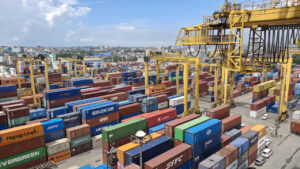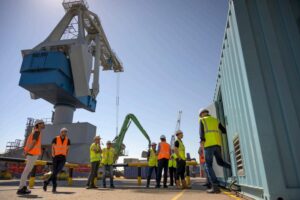A consortium comprising AB InBev, Accenture, APL, Kuehne + Nagel and a European customs organization has successfully tested a blockchain distributed ledger technology.
The consortium has tested a solution that they claim can eliminate the need for printed shipping documents and save the freight and logistics industry hundreds of millions of dollars annually.
It has stated that it will do this with blockchain technology that uses single ownership principles determined by the type of information.
Through a detailed review of the current documentation processes, the group has examined a re-allocation of information ownership, accountability and risk enabled by the trust and security blockchain technology offers.
An international shipment of goods for companies in areas such as the automotive, retail or consumer goods industries typically requires more than 20 different documents, many of which are often paper-based, to enable the goods to move from exporter to importer.
The document heavy approach limits data quality and real-time visibility to all parties involved in the trade and this can delay the financial settlement of goods.
However, the group has reported that the new solution can speed up the entire flow of transport documents, reduce the requirement for data entry by up to 80%, simplify data amendments across the shipping process, streamline the checks required for cargo and reduce the burden and risk of penalties for customs compliance levied on customers.
Accenture provided the technology and consulting expertise on the blockchain technology and developed the technical architecture required to support a blockchain solution, leveraging the capabilities of its Singapore IoT Hub to build the prototype.
Adriana Diener-Veinott, who leads Accenture’s Freight & Logistics industry practice, said: “Our trials have proven the viability of a shipping process in which many documents can be replaced by secure and distributed data sharing with clear and defined ownership.
“This gives companies a significant opportunity to save time and money while improving their service to customers.”
Read the latest technical paper by Wolfgang Lehmacher, Author, Global Executive, Advisor, Entrepreneur, and expert in the field of Supply Chains, Transport and Logistics, the WEF, to gain a better understanding of how blockchain works
Each organization involved in the trials typified a particular stakeholder in the shipping process: AB InBev represented a typical exporter; APL contributed its role as a shipping organization; Kuehne + Nagel provided direction on the requirements for a freight forwarder and a European customs organization replicated the regulatory requirements that cargo faces.
Eddie Ng, head of Strategic Liner Management at APL, said: “As a facilitator of global trade and strong advocate of innovation, APL sees much potential in blockchain technology to accelerate the digital transformation of the container shipping industry, moving us from traditional paper-based transactions to more efficient, more secure and faster processes along the entire supply chain.
“We are therefore happy to be part of the exciting journey to explore how disruptive technology like blockchain can benefit our industry, and ultimately our shippers and their customers.”
Martin Kolbe, Chief Information Officer of Kuehne + Nagel International AG, said: “As part of Kuehne + Nagel’s digitalization strategy, we explore innovative technologies to create benefits for our customers.
“Blockchain is one of the most promising technologies in logistics. It has the potential to digitalize many of today’s paper-based processes and overcome the multitude of different interfaces.
“From our perspective, the open and collaborative approach applied in this project is key to gaining traction in the industry and the required market acceptance.”
Danillo Figueiredo, VP of International Logistics, AB InBev, said: “We continually evaluate new technologies and innovations to enhance our operations to meet consumer needs and deliver the freshest beer.
“Blockchain technology will be transformational to our business and the world. It reduces mistakes, digitizes information and improves the supply chain process so we can focus on our core business of brewing the best beers for consumers.”









